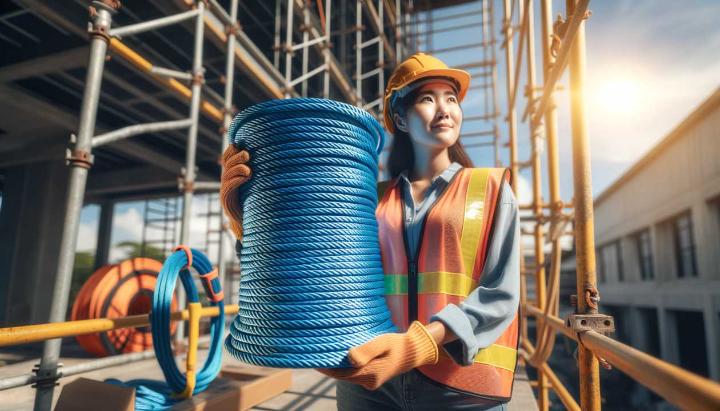Have you ever wondered why some rope suppliers seem to be stuck in the past, clinging to outdated wire rope technology? It's time to unravel the truth about synthetic rope and discover why it's revolutionising industries worldwide. As a leading rope supplier near you, we're here to shed light on the game-changing benefits of synthetic rope that will make you question everything you thought you knew about rope safety and ease of use.
In this eye-opening exploration, we'll delve into the drawbacks of traditional wire rope and reveal how synthetic rope is transforming workplaces with its remarkable safety features, lightweight design, and unparalleled versatility. Whether you're in construction, marine operations, or outdoor adventures, understanding the stark differences between wire and synthetic rope could be the key to elevating your efficiency and ensuring the well-being of your team.
Join us as we uncover why more and more professionals are turning to supplier wire rope specialists who prioritise synthetic options. From enhanced safety to effortless handling, we'll show you why making the switch to synthetic rope isn't just a choice – it's a crucial step towards a safer, more efficient future. Are you ready to discover the rope solution that could revolutionise your operations?
Understanding Wire Rope Drawbacks
When searching for a wire rope supplier near me, it's crucial to understand the limitations of this traditional material. Wire rope, composed of multiple steel wires twisted into strands, has been a stalwart in various industries for decades. However, its drawbacks can significantly impact safety and ease of use.
Common Failure Points in Wire Rope
Wire rope's susceptibility to failure is a major concern for many users. Fatigue failure, resulting from repeated cyclic loading, is one of the most common issues. As I've learned from years of experience in the field, this can lead to sudden and catastrophic breakages if not addressed promptly.
Have you ever heard of the 3-6 rule? It's a critical guideline in wire rope maintenance:
- Replace immediately if there are 6 or more broken wires in one lay
- Or if there are 3 or more broken wires in one strand
This rule underscores the constant vigilance required when using wire rope, which can be both time-consuming and costly.
Maintenance Challenges of Wire Rope
The maintenance demands of wire rope can be daunting. Regular inspections are essential, but assessing internal damage can be particularly challenging. I once worked on a project where seemingly minor external wear masked significant internal corrosion, leading to an unexpected equipment failure.
Environmental factors like moisture and chemicals can accelerate wire rope deterioration, necessitating more frequent replacements and increasing operational costs.
Moreover, the heaviness and rigidity of wire rope make it difficult to handle, especially in confined spaces or when working at heights. This not only slows down operations but also increases the risk of worker fatigue and potential injuries.
While wire rope has its place in certain applications, these drawbacks highlight the need for alternatives that offer improved safety, ease of use, and longevity. As we explore options from rope suppliers near me, it's worth considering how synthetic ropes might address these challenges and provide a more efficient solution for your specific needs.
Advantages of Synthetic Rope from Local Suppliers
As someone who's spent years working with various types of ropes, I can confidently say that synthetic rope has revolutionized the industry. Let's dive into why choosing synthetic rope from a local supplier near you might be the game-changer you've been looking for.
Lightweight and Strong: Key Benefits of Synthetic Rope
Picture this: you're on a job site, and you need to move a heavy load. With traditional wire rope, you'd be bracing yourself for a workout. But with synthetic rope, it's a whole different story. I remember the first time I switched to synthetic rope for a marine winching operation - the difference was night and day.
- Incredible strength-to-weight ratio: Synthetic rope is up to seven times lighter than steel wire rope of the same diameter, yet it doesn't compromise on strength.
- Easier handling and transportation: The lightweight nature of synthetic rope means less physical strain and improved efficiency on the job.
- Reduced equipment wear: The lighter weight puts less stress on winches and other machinery, potentially extending their lifespan.

Versatility and Durability: Why Choose Synthetic Rope
Synthetic rope isn't just about being lightweight. Its versatility and durability make it a standout choice for a wide range of applications. From marine environments to heavy industry, synthetic rope has proven its worth time and time again.
One of the most impressive aspects of synthetic rope is its resistance to environmental factors. Unlike wire rope, which can rust and corrode, synthetic rope stands up to the elements with remarkable resilience. I've seen synthetic ropes perform flawlessly in harsh coastal environments where wire ropes would have deteriorated rapidly.
- UV resistance: Many synthetic ropes are treated to withstand prolonged exposure to sunlight, maintaining their strength and integrity.
- Chemical resistance: Depending on the specific material, synthetic ropes can resist a wide range of chemicals, making them ideal for industrial applications.
- Longevity: With proper care, synthetic winch ropes can last up to 10 years, offering excellent value for money.
Have you ever considered the safety implications of your rope choice? Synthetic rope's softness and pliability significantly reduce the risk of injuries from broken strands or sharp edges - a common hazard with wire rope. This makes it an excellent choice for environments where worker safety is paramount.
In conclusion, the advantages of synthetic rope from local suppliers are clear: superior strength-to-weight ratio, versatility across various applications, and enhanced safety features. Whether you're in the marine industry, construction, or outdoor recreation, synthetic rope offers a modern solution to traditional rope challenges. By choosing a local supplier, you're not only getting a high-quality product but also supporting your community and ensuring quick access to expert advice and service.
Have you made the switch to synthetic rope yet? If not, it might be time to explore the options available from your local rope supplier. Your operations could benefit significantly from this innovative material.
Safety Benefits of Synthetic Rope vs Wire Rope
When it comes to choosing the right rope for your operations, safety should be your top priority. As someone who's worked extensively with both wire and synthetic ropes, I can confidently say that synthetic rope offers significant safety advantages. Let's dive into why a supplier wire rope specializing in synthetic options might be your best bet for ensuring workplace safety.
Advantages of Choosing a Supplier Specializing in Synthetic Rope
Opting for a supplier that specializes in synthetic rope can make a world of difference in terms of safety and performance. These suppliers bring a wealth of expertise to the table, ensuring you get the right rope for your specific needs.
- Expert material selection: A specialized supplier can help you choose the optimal synthetic material for your application, whether it's high-strength HMPE for heavy lifting or nylon for its excellent shock absorption properties.
- Customization options: Need a rope with specific safety features? A synthetic rope specialist can often provide custom solutions, such as integrated wear indicators or UV-resistant coatings.
- Quality control: Reputable suppliers adhere to strict quality control measures, ensuring every rope meets or exceeds industry safety standards.

Comparing Safety Factors: Synthetic vs Wire Rope
When it comes to safety factors, synthetic rope often outperforms wire rope. OSHA standards require specific safety factors for synthetic fiber slings, typically ranging from 6 to 9 depending on the material. This means a synthetic rope sling can safely handle loads up to six to nine times its rated capacity.
In contrast, wire rope typically has a safety factor of 5. This lower safety factor, combined with wire rope's susceptibility to fatigue and corrosion, can increase the risk of unexpected failures.
Did You Know?
Synthetic rope is up to seven times lighter per-diameter than wire rope, significantly reducing the risk of back injuries and worker's compensation claims.
The lightweight nature of synthetic rope isn't just about convenience - it's a major safety feature. I've seen firsthand how switching to synthetic rope can dramatically reduce the physical strain on workers, leading to fewer injuries and a safer work environment overall.
Moreover, synthetic rope's flexibility and soft texture make it much less likely to cause injuries from recoil or broken strands, a common hazard with wire rope. This improved handling also allows for quicker, safer rigging and de-rigging processes.
Remember, when it comes to workplace safety, every detail matters. By choosing a supplier wire rope that specializes in synthetic options, you're not just getting a product - you're investing in a safer, more efficient workplace. Isn't it time you explored the synthetic rope options available to you?
Ease of Use and Versatility of Synthetic Rope
As someone who's worked with ropes for over two decades, I can confidently say that synthetic rope has revolutionised the industry. The ease of use and versatility it offers are unparalleled, making it a go-to choice for professionals across various sectors.
Lightweight Advantages of Synthetic Rope
One of the most striking features of synthetic rope is its incredibly light weight. I remember the first time I switched from wire rope to synthetic on a major construction project. The difference was astonishing - suddenly, tasks that once required heavy machinery could be done with minimal effort.
- Significantly lighter than wire rope: Synthetic rope can be up to 80% lighter than steel wire rope of the same diameter, making it much easier to handle and transport.
- Reduced worker fatigue: The lightweight nature means less physical strain during long workdays, leading to increased productivity and fewer workplace injuries.
- Easier transportation: Moving synthetic rope from one job site to another is a breeze, saving time and reducing logistical headaches.

Strength and Durability Features
Don't let the lightweight fool you - synthetic rope packs a serious punch when it comes to strength and durability. I've seen synthetic ropes outperform their wire counterparts in some of the most demanding environments.
- Impressive strength-to-weight ratio: Many synthetic ropes offer strengths equal to or greater than steel wire rope at a fraction of the weight.
- Resistance to environmental factors: Unlike wire rope, synthetic options don't rust or corrode, making them ideal for marine and offshore applications.
- Longevity: With proper care, synthetic ropes can last significantly longer than traditional wire ropes, offering excellent value for money.
Applications and Industries for Synthetic Rope
The versatility of synthetic rope never ceases to amaze me. I've seen it used in ways I never thought possible when I first started in this industry. Here are just a few examples:
- Marine industry: From mooring lines to winch lines, synthetic rope has become a staple in maritime operations.
- Construction: Its lightweight nature makes it perfect for scaffolding, hoisting, and temporary supports.
- Outdoor recreation: Climbing, camping, and water sports enthusiasts love the strength and durability of synthetic ropes.
- Agriculture: Farmers use synthetic rope for everything from baling to animal handling, appreciating its resistance to rot and mildew.
Have you considered how synthetic rope could improve your operations? Whether you're in heavy industry or running a small business, the ease of use and versatility of synthetic rope can make a significant difference in your day-to-day activities.
Did You Know?
Synthetic rope can float on water, making it invaluable for marine rescue operations!
In my experience, once people make the switch to synthetic rope, they rarely go back. The combination of lightweight handling, impressive strength, and versatile applications make it a game-changer for countless industries. Why not explore how synthetic rope could transform your projects?
While a wire rope supplier near me provides traditional options, these ropes are often heavy, rigid, prone to corrosion, and can cause injuries due to broken wires. On the other hand, synthetic ropes from a local rope supplier near me offer significant advantages: they are lightweight, flexible, and have a higher strength-to-weight ratio. These ropes are also resistant to corrosion, UV damage, and rot, making them safer and easier to handle. Synthetic ropes ensure reduced injuries and better compliance with safety standards, providing an effortless solution for various applications. Choosing a supplier wire rope specializing in synthetic options not only enhances safety but also offers versatile, durable, and easy-to-use solutions for your needs.
Inquire About Our Rope Solutions Today
If you're looking for high-quality, safe, and versatile rope solutions, be sure to get in touch through the inquiry form above. Our experts are ready to assist you in choosing the perfect rope for your requirements!